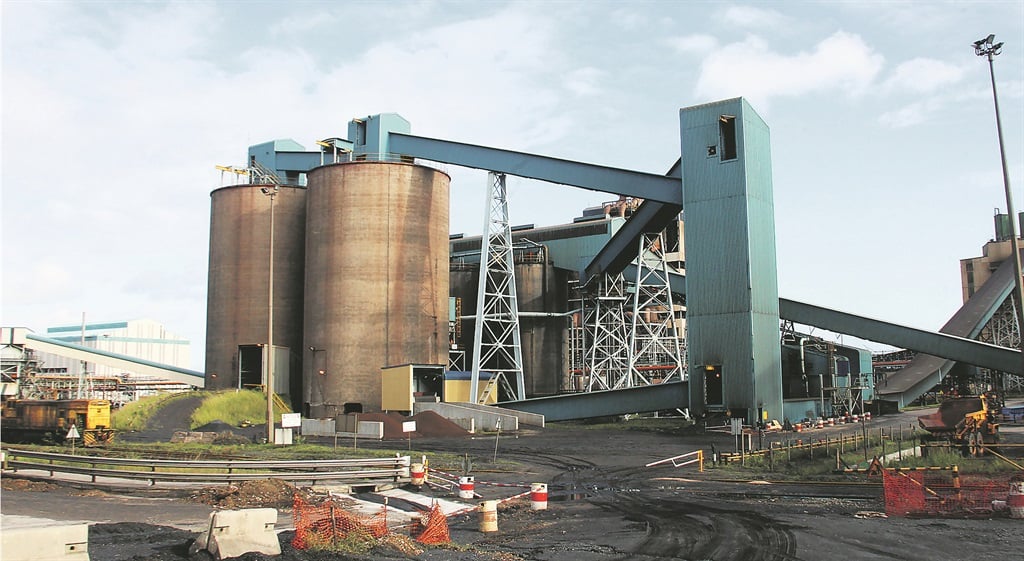
An uneasy sense of calm has returned to Rio Tinto’s Richards Bay Minerals (RBM) mine in Kwambonambi on the KwaZulu-Natal north coast, which resumed operations this week after violent community protests forced a shutdown last week.
The return to work may be short-lived, however, as the National Union of Mineworkers (NUM), which has a 70% majority among the 4 000-strong workforce, is threatening action over the company’s decision to force permanent staff to take paid leave during the shutdown, and its a no work, no pay policy for contract workers.
Half of RBM’s workforce is on contract and is recruited via labour brokers.
On Thursday morning, before going back to work, the NUM’s members held a meeting to discuss action over the wages issue and safety at the mine, which consists of a series of opencast dune pits from which high-quality pig iron, rutile, titania slag and zircon are extracted for the Chinese, US and European paint, paper and electronics manufacturing markets.
They threatened action if the company withheld pay for the shutdown, during which only essential staff and small maintenance crews were on site.
Residents of the Sokhulu and Mbonambi communities, where RBM’s smelter and dune mine have been operating for 40 years, burnt four mine vehicles and blocked access roads with burning tyres and logs in an attempt to force the company to employ more locals.
RBM employs 400 people from the 40 000-member Mbonambi community and a further 160 from Sokhulu, which has about 9 000 residents.
The protesters, who held a march outlining their grievances on April 25, also claim the company has failed to meet its commitments for community development programmes, and they want more money for skills training and more opportunities for local businesspeople to tender for RBM contracts.
The company shut down last Saturday after police were called in to disperse protesters, sending staff on leave and bringing in maintenance crews.
“RBM took a unilateral decision to go on shutdown,” said Emmanuel Zakwe, the NUM permanent shop steward at RBM.
“Our members cannot be the ones to pay for it. If their full pay is not paid at the end of the month, we will take the company head on.”
The threat from the NUM puts additional pressure on a fragile agreement brokered between RBM and the two communities by KwaZulu-Natal Economic Development MEC Mike Mabuyakhulu, who met protesters, traditional leaders, local government, the police and regional business to try to get the mine reopened while a team drawn from the various interest groups reviews RBM’s employment practices and social investment targets.
On Tuesday, Mabuyakhulu told residents of Mbonambi that the team would review the social investment, contracting and employment situation and report back in a month.
Mabuyakhulu stressed the importance of keeping RBM – which contributes 50% of KwaZulu-Natal’s mining revenue through the 2 million tons of products it exports annually – in operation for the sake of the regional economy.
He was less well received on Wednesday in Sokhulu, where the pits are located and where the arson attacks and assaults on workers took place last week.
A group of young people walked out during his speech, sparking fears that they may not abide by the commitment their leaders gave to allow safe access for workers.
Boy Mthembu (51), a stores clerk who has been at RBM for 11 years, said he had been concerned for his safety during the protests and couldn’t go to work. He said the company needed to pay more attention to the community’s needs.
“People are angry. The young people need jobs, but they don’t get them. The company needs to do more. My house was damaged by trucks from RBM. I complained last year, but nobody has come to see what happened,” he said.
A resident involved in the Mbonambi protests, who asked not to be named, said they would “wait and see” what came from the new agreement.
The 28-year-old, who has matric and certificates in welding, has been trying to get a job with RBM for 10 years, but has not managed more than a three-month contract.
“We are tired. It’s like being buried alive, sitting here and watching people from outside coming here in buses every day. For every 10 buses, only one has people from this area. If you don’t have a contact with the labour broker or with RBM, you can forget it,” he said.
On Thursday morning, convoys of earth-moving machines began leaving the smelter area at Mbonambi and heading past piles of burnt logs that were still in the road after the protests.
RBM spokesperson Fundi Dlamini said the decision to return to work while the task team tried to resolve community grievances had been made after their leaders had guaranteed that there would be no more attacks.
Addressing Tuesday’s meeting, Mabuyakhulu told community members that a lengthy conflict would force RMB to close the mine, affecting the entire region economically.
Mabuyakhulu said that while discussions to find a long-term solution continued, the law would take its course. “If you are from the community and you are dirty, the law will deal with you. If you are from the company and you are dirty, the law will deal with you.”
Department of mineral resources spokesperson Martin Madlala said the department was part of the stakeholder forums convened by Mabuyakhulu to try to resolve the crisis.
“These engagements include meeting with the different communities and the mines, with the aim of finding sustainable solutions to the current challenge,” he said.




 Publications
Publications
 Partners
Partners








